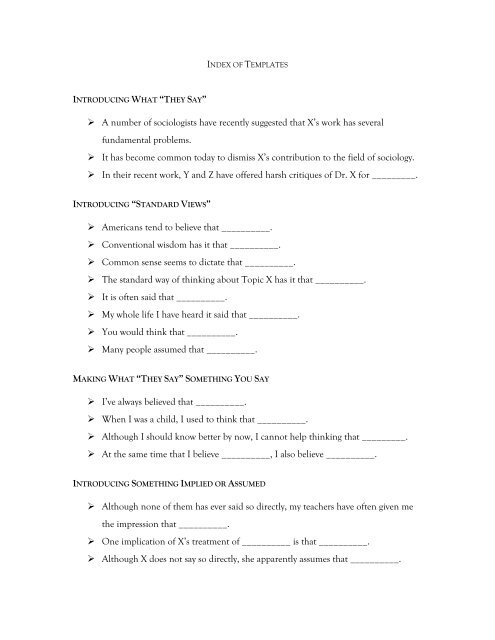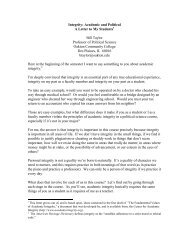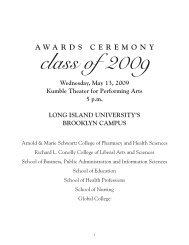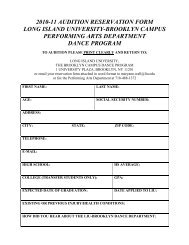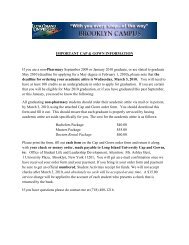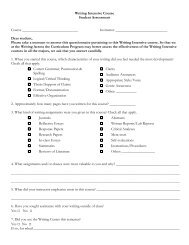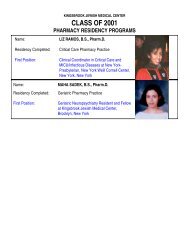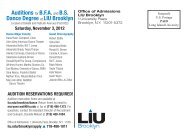Index of Templates (transitional phrases, key words, etc.)
Index of Templates (transitional phrases, key words, etc.)
Index of Templates (transitional phrases, key words, etc.)
You also want an ePaper? Increase the reach of your titles
YUMPU automatically turns print PDFs into web optimized ePapers that Google loves.
INDEX OF TEMPLATES<br />
INTRODUCING WHAT “THEY SAY”<br />
‣ A number <strong>of</strong> sociologists have recently suggested that X’s work has several<br />
fundamental problems.<br />
‣ It has become common today to dismiss X’s contribution to the field <strong>of</strong> sociology.<br />
‣ In their recent work, Y and Z have <strong>of</strong>fered harsh critiques <strong>of</strong> Dr. X for _________.<br />
INTRODUCING “STANDARD VIEWS”<br />
‣ Americans tend to believe that __________.<br />
‣ Conventional wisdom has it that __________.<br />
‣ Common sense seems to dictate that __________.<br />
‣ The standard way <strong>of</strong> thinking about Topic X has it that __________.<br />
‣ It is <strong>of</strong>ten said that __________.<br />
‣ My whole life I have heard it said that __________.<br />
‣ You would think that __________.<br />
‣ Many people assumed that __________.<br />
MAKING WHAT “THEY SAY” SOMETHING YOU SAY<br />
‣ I’ve always believed that __________.<br />
‣ When I was a child, I used to think that __________.<br />
‣ Although I should know better by now, I cannot help thinking that _________.<br />
‣ At the same time that I believe __________, I also believe __________.<br />
INTRODUCING SOMETHING IMPLIED OR ASSUMED<br />
‣ Although none <strong>of</strong> them has ever said so directly, my teachers have <strong>of</strong>ten given me<br />
the impression that __________.<br />
‣ One implication <strong>of</strong> X’s treatment <strong>of</strong> __________ is that __________.<br />
‣ Although X does not say so directly, she apparently assumes that __________.
INTRODUCING AN ONGOING DEBATE<br />
‣ In discussions <strong>of</strong> X, one controversial issue has been __________. On the one<br />
hand, __________ argues __________. On the other hand, __________<br />
contends __________. Others even maintain __________. My own view is<br />
__________.<br />
‣ When it comes to the topic <strong>of</strong> __________, most <strong>of</strong> us will readily agree that<br />
__________. Where this agreement usually ends, however, is on the question <strong>of</strong><br />
__________. Whereas some are convinced that __________, others maintain that<br />
__________.<br />
‣ In conclusion, then, as I suggested earlier, defenders <strong>of</strong> __________ can’t have it<br />
both ways. Their assertion that __________ is contradicted by their claim that<br />
__________.<br />
CAPTURING AUTHORIAL ACTION<br />
‣ X acknowledges that __________.<br />
‣ X agrees that __________.<br />
‣ X argues that __________.<br />
‣ X believes that __________.<br />
‣ X denies/does not deny that _____.<br />
‣ X claims that __________.<br />
‣ X complains that __________.<br />
‣ X concedes that __________.<br />
‣ X demonstrates that __________.<br />
‣ X deplores the tendency to ______.<br />
‣ X celebrates the fact that ________.<br />
‣ X emphasizes that __________.<br />
‣ X insists that __________.<br />
‣ X observes that __________.<br />
‣ X questions that __________.<br />
‣ X refuses the claim that ________.<br />
‣ X reminds us that __________.<br />
‣ X suggests that __________.<br />
‣ X urges us to __________.<br />
INTRODUCING QUOTATIONS<br />
‣ X states, “__________.”<br />
‣ As the prominent philosopher X puts it, “__________.”<br />
‣ According to X, “__________.”
‣ X herself writes, “__________.”<br />
‣ In his book, __________, X maintains that “__________.”<br />
‣ In X’s view, “__________.”<br />
‣ X agrees/disagrees when she writes, “__________.”<br />
‣ X complicates matters further when he writes, “__________.”<br />
EXPLAINING QUOTATIONS<br />
‣ Basically, X is saying __________.<br />
‣ In other <strong>words</strong>, X believes __________.<br />
‣ In making this comment, X argues that __________.<br />
‣ X is insisting that __________.<br />
‣ X’s point is that __________.<br />
‣ The essence <strong>of</strong> X’s argument is that __________.<br />
DISAGREEING, WITH REASONS<br />
‣ I think X is mistaken because she overlooks __________.<br />
‣ X’s claim that __________ rests upon the questionable assumption that<br />
__________.<br />
‣ I disagree with X’s view that __________ because, as recent research has shown,<br />
__________.<br />
‣ X contradicts himself. On the one hand, he argues __________. But on the other<br />
hand, he also says __________.<br />
‣ By focusing on __________, X overlooks the deeper problem <strong>of</strong> __________.<br />
‣ X claims __________, but we don’t need him to tell us that. Anyone familiar with<br />
__________ has long known that __________.<br />
AGREEING—WITH A DIFFERENCE<br />
‣ I agree that __________ because my experience __________ confirms it.<br />
‣ X surely is right about __________ because, as she may not be aware, recent studies<br />
have shown that __________.
‣ X’s theory <strong>of</strong> __________ is extremely useful because it sheds insight on the<br />
difficult problem <strong>of</strong> __________.<br />
‣ I agree that __________, a point that needs emphasizing since so many people<br />
believe __________.<br />
‣ Those unfamiliar with this school <strong>of</strong> thought may be interested to know that it<br />
basically boils down to __________.<br />
‣ If group X is right that __________, as I think they are, then we need to reassess<br />
the popular assumption that __________.<br />
AGREEING AND DISAGREEING SIMULTANEOUSLY<br />
‣ Although I agree with X up to a point, I cannot accept his overall conclusion that<br />
__________.<br />
‣ Although I disagree with much that X says, I fully endorse his final conclusion that<br />
__________.<br />
‣ Though I concede that __________, I still insist that __________.<br />
‣ Whereas X provides ample evidence that __________, Y and Z’s research on<br />
__________ and __________ convinces me that __________ instead.<br />
‣ X is right that __________, but she seems on more dubious ground when she<br />
claims that __________.<br />
‣ While X is probably wrong when she claims that __________, she is right that<br />
__________.<br />
‣ I’m <strong>of</strong> two minds about X’s claim that __________. On the one hand, I agree that<br />
__________. On the other hand, I’m not sure if __________.<br />
‣ My feelings on the issue are mixed. I do support X’s position that __________, but<br />
I find Y’s argument about __________ and Z’s research on __________ to be<br />
equally persuasive.<br />
SIGNALING WHO IS SAYING WHAT<br />
‣ X argues __________.<br />
‣ According to both X and Y, __________.
‣ Politicians __________, X argues, should __________.<br />
‣ Most athletes will tell you that __________.<br />
‣ My own view, however, is that __________.<br />
‣ I agree, as X may not realize, that __________.<br />
‣ But __________ are real and, arguably, the most significant factor in __________.<br />
‣ But X is wrong that __________.<br />
‣ However, it is simply not true that __________.<br />
‣ Indeed, it is highly likely that __________.<br />
‣ But the view that __________ does not fit all the facts.<br />
‣ X is right/wrong that __________.<br />
‣ X is both right and wrong that __________.<br />
‣ Yet a sober analysis <strong>of</strong> the matter reveals __________.<br />
‣ Nevertheless, new research shows __________.<br />
‣ Anyone familiar with __________ should see that __________.<br />
EMBEDDING VOICE MARKERS<br />
‣ X overlooks what I consider an important point about __________.<br />
‣ My own view is that what X insists is a __________ is in fact a __________.<br />
‣ I wholeheartedly endorse what X calls __________.<br />
‣ These conclusions, which X discusses in __________, add weight to the argument<br />
that __________.<br />
ENTERTAINING OBJECTIONS<br />
‣ Yet some readers may challenge the view that __________. After all, many believe<br />
__________. Indeed, my own argument that __________ seems to ignore<br />
__________ and __________.<br />
‣ Of course, many will probably disagree with this assertion that __________.
NAMING YOUR NAYSAYERS<br />
‣ Here many feminists would probably object that __________.<br />
‣ But social Darwinists would certainly take issue with the argument that __________.<br />
‣ Biologists, <strong>of</strong> course, may want to dispute my claim that __________.<br />
‣ Nevertheless, both followers and critics <strong>of</strong> Malcolm X will probably dispute my claim<br />
that __________.<br />
‣ Although not all Christians think alike, some <strong>of</strong> them will probably dispute my<br />
claim that __________.<br />
‣ Non-native English speakers are so diverse in their views that it’s hard to generalize<br />
about them, but some are likely to object on the grounds that __________.<br />
MAKING CONCESSIONS WHILE STILL STANDING YOUR GROUND<br />
‣ Although I grant that __________, I still maintain that __________.<br />
‣ Proponents <strong>of</strong> X are right to argue that __________. But they exaggerate when they<br />
claim that __________.<br />
‣ While it is true that __________, it does not necessarily follow that __________.<br />
‣ On the one hand, I agree with X that __________. But on the other hand, I still<br />
insist that __________.<br />
INDICATING WHO CARES<br />
‣ __________ used to think __________. But recently [or within the past few<br />
decades] __________ suggests that __________.<br />
‣ What this new research does, then, is correct the mistaken impression, held by<br />
many earlier researchers, that __________.<br />
‣ These findings challenge the work <strong>of</strong> earlier researchers, who tended to assume that<br />
__________.<br />
‣ Recent studies like these shed new light on __________, which previous studies<br />
had not addressed.
‣ Researchers have long assumed that __________. For instance, one eminent<br />
scholar <strong>of</strong> cell biology, __________, assumed in __________, her seminal work on<br />
cell structures and functions, that fat cells __________. As __________ herself put<br />
it, “__________” (200-). Another leading scientist, __________, argued that fat<br />
cells “__________” (200-). Ultimately, when it came to the nature <strong>of</strong> fat, the basic<br />
assumption was that __________.<br />
But a new body <strong>of</strong> research shows that fat cells are far more complex and<br />
that __________.<br />
‣ If sports enthusiasts stopped to think about it, many <strong>of</strong> them might simply assume<br />
that the most successful athletes __________. However, new research shows<br />
__________.<br />
‣ These findings challenge dieters’ common assumptions that __________.<br />
‣ At first glance, teenagers appear to__________. But on closer inspection<br />
__________.<br />
ESTABLISHING WHY YOUR CLAIMS MATTER<br />
‣ X matters/is important because __________.<br />
‣ Although X may seem trivial, it is in fact crucial in terms <strong>of</strong> today’s concern over<br />
__________.<br />
‣ Ultimately, what is at stake here is __________.<br />
‣ These findings have important consequences for the broader domain <strong>of</strong><br />
__________.<br />
‣ My discussion <strong>of</strong> X is in fact addressing the larger matter <strong>of</strong> __________.<br />
‣ These conclusions/This discovery will have significant applications in __________<br />
as well as in __________.<br />
‣ Although X may seem <strong>of</strong> concern to only a small group <strong>of</strong> __________, it should<br />
in fact concern anyone who cares about __________.<br />
From “They Say/I Say”: The Moves That Matter in Academic Writing, by Gerald Graff and<br />
Cathy Birkenstein. W.W. Norton & Company: New York, 2006.
COMMONLY USED TRANSITIONS<br />
Cause and Effect<br />
accordingly<br />
as a result<br />
consequently<br />
hence<br />
it follows, then<br />
since<br />
so<br />
then<br />
therefore<br />
thus<br />
Conclusion<br />
as a result<br />
consequently<br />
hence<br />
in conclusion, then<br />
in short<br />
in sum, then<br />
it follows, then<br />
so<br />
the upshot <strong>of</strong> all this<br />
is that<br />
therefore<br />
thus<br />
to sum up<br />
to summarize<br />
Comparison<br />
along the same lines<br />
in the same way<br />
likewise<br />
similarly<br />
Contrast<br />
although<br />
but<br />
by contrast<br />
conversely<br />
despite the fact that<br />
even though<br />
however<br />
in contrast<br />
nevertheless<br />
nonetheless<br />
on the contrary<br />
on the other hand<br />
regardless<br />
whereas<br />
while<br />
yet<br />
Addition<br />
also<br />
and<br />
besides<br />
furthermore<br />
in addition<br />
in fact<br />
indeed<br />
moreover<br />
so too<br />
Concession<br />
admittedly<br />
although it is true that<br />
granted<br />
I concede that<br />
<strong>of</strong> course<br />
naturally<br />
to be sure
Example<br />
after all<br />
as an illustration<br />
consider<br />
for example<br />
for instance<br />
specifically<br />
to take a case in<br />
point<br />
Elaboration<br />
actually<br />
by extension<br />
in short<br />
that is<br />
in other <strong>words</strong><br />
to put it another way<br />
to put it bluntly<br />
to put it succinctly<br />
ultimately<br />
From “They Say/I Say”: The Moves That Matter in Academic Writing, by Gerald Graff and<br />
Cathy Birkenstein. W.W. Norton & Company: New York, 2006.


